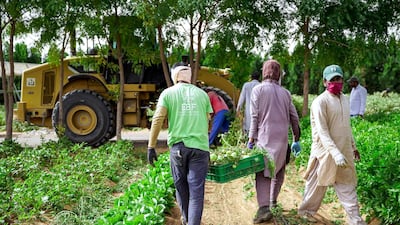The Abu Dhabi Investment Office is dispersing $41 million to three technology firms to boost initiatives that address global food security challenges under the Ghadan 21 accelerator programme.
Adio has partnered with tech-enabled farming company Pure Harvest Smart Farms, grocery platform FreshToHome and space research firm Nanoracks to develop local expertise and new ways of producing food in arid climates.
"We've gone to land, sea and space" to identify companies to work with, Tariq Bin Hendi, director general of Adio, told The National.
“Abu Dhabi is pressing ahead at full steam with our mission to ‘turn the desert green."
Food security and innovation in agriculture are priorities of the UAE. The Abu Dhabi government has earmarked Dh1 billion ($272m) for the agri-tech incentive programme as part of the government’s Ghadan 21 accelerator initiative.
Between 80 and 90 per cent of the food in the GCC is imported, according to Chatham House.
While the figure is relatively high, UAE residents are starting to reap the benefits of recent efforts: locally-harvested produce at the market or on dining menus are now a common sight. Much of this surfaced over the last few years as vertical and hydroponic farming ventures and research, as well as cloud-seeding, bear fruit.
The Covid-19 pandemic accelerated the push for greater food security in the UAE, Mr Bin Hendi said. Adapting technology and developing local talent in order to be exporters of solutions is "the bare minimum" goal of the programme, he said.
Funding from Adio can cover costs related to Abu Dhabi-based employees, purchasing equipment for research and development and as rebates on land use. The country’s 24,000 farms are set to benefit if new technology can be applied to drive efficiencies in crop yield and water usage, Mr Bin Hendi said.
Earlier this year, Adio invested $100m to bring four other agriculture companies to the emirate to attract high-skilled talent and cutting-edge research. The three companies named on Tuesday are the latest in a wave of funding under the Ghadan21 initiative.
This investment is also among the biggest efforts by the UAE to apply research in space to farming.
“Much of today’s technology used for vertical, urban and closed environment agriculture initially came from space research from 30 years ago," Allen Herbert, head of Nanoracks, UAE, said. "We firmly believe that space research holds the keys to solving major challenges on Earth from climate change to food security."
The US-based company is the single largest commercial user of the International Space Station and is building the first-ever commercial AgTech space research programme.
Nanoracks is now planning a ‘StarLab Space Farming Centre’ in Abu Dhabi. It will be a commercial space research facility focused on advancing knowledge and technology for organisms as well as food produced in space and in equally extreme climates on Earth.
The space-based technology will be applied to desert agriculture to address pressing environmental and food security challenges and to benefit long-term human space exploration, according to the company.
AeroFarms, which took part in the first tranche of Adio funding, has made significant headway in establishing its Abu Dhabi operations.
It received more than 9,000 job applications for work at its desert agriculture research facility in Abu Dhabi and is forging local partnerships.
David Rosenberg, co-founder and chief executive, said the New Jersey company is working with the College of Food and Agriculture at UAE University in Al Ain to develop "a new generation of farm technologies and talents".


